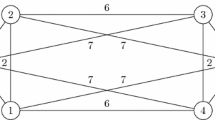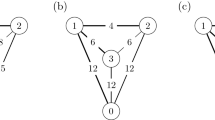Abstract
In this paper the traveling salesman problem is used as an example to describe an allocation concept for cooperative scenarios where besides a common objective function also individual objectives of players are of importants. From a game theoretical view, such a problem corresponds to a cooperative game with non-transferable as well as transferable utilities. We define formally this cooperative game as well as an allocation concept motivated by the Shapley NTU value.
Access this chapter
Tax calculation will be finalised at checkout
Purchases are for personal use only
Similar content being viewed by others
References
Andersen, K. A., & Lind, M. (1999). Computing the NTU-Shapley value of NTU games defined by multiple objective linear programs. International Journal of Game Theory, 28, 585–597.
Christinsen, F., Lind, M., & Tind, J. (1996). On the Nucleolus of NTU-games defined by multiple objective linear programs. Mathematical Methods of Operations Research, 43, 337–352.
Fernandez, F. R., Hinojosa, M. A., & Puerto, J. (2003). Multi-criteria minimum cost spanning tree games. European Journal of Operational Research, 158, 399–408.
Fernandez, F. R., Hinojosa, M. A., & Puerto, J. (2004). Set-valued TU games. European Journal of Operational Research, 159, 181–195.
Kimms, A., & Kozeletskyi, I. (2017). Consideration of multiple objectives in horizontal cooperation with an application to transportation planning. IEEE Transactions(to appear).
Kimms, A., Kozeletskyi I., & Meca, A. (2014). Bi-allocation games: A new class of cooperative games with transferable and non-transferable utilities. Working Paper.
Kozeletskyi, I. (2016). Game-theoretic approaches to allocation Problems in cooperative routing. Books on Demand.
Nishizaki, I., & Sakawa, M. (2001). On computational methods for solutions of multiobjective linear production games. European Journal of Operational Research, 129, 386–413.
Shapley, L. S. (1988). Utility comparison and the theory of games. In A. E. Roth (Ed.), The Shapley value: Essays in honor of Lloyd S. Shapley (pp. 307–319). Cambridge: Cambridge University Press.
Author information
Authors and Affiliations
Corresponding author
Editor information
Editors and Affiliations
Rights and permissions
Copyright information
© 2018 Springer International Publishing AG, part of Springer Nature
About this paper
Cite this paper
Kozeletskyi, I. (2018). Shapley Value Based Allocation for Multi-objective Cooperative Problems. In: Kliewer, N., Ehmke, J., Borndörfer, R. (eds) Operations Research Proceedings 2017. Operations Research Proceedings. Springer, Cham. https://doi.org/10.1007/978-3-319-89920-6_3
Download citation
DOI: https://doi.org/10.1007/978-3-319-89920-6_3
Published:
Publisher Name: Springer, Cham
Print ISBN: 978-3-319-89919-0
Online ISBN: 978-3-319-89920-6
eBook Packages: Business and ManagementBusiness and Management (R0)




